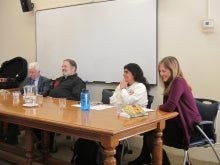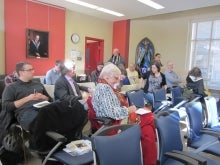
TMTC Hosts Discussion Panel on ‘Settler-Indigenous’ Relations
By Jonathan Seiling
TMTC has for its entire existence been a means for people to gather around topics of common interest. It has also become a centre, an institutional hub, where ecumenical dialogue can take place on an ad-hoc basis. In the past issues such as the invasion of Iraq or other peace-related concerns have typically been seen as the agenda. Sometimes the unifying interests have been historical, and sometimes contemporary. At times the question of how we reflect on our history and how such reflection might unite or divide us, bridges the concerns of historians and theologians alike.
The panel discussion on the book Buffalo Shout, Salmon Cry (ed. Steve Heinrichs, Herald Press, 2013) hosted by TMTC on March 18 was a shining example of TMTC’s role as a meeting place for various interests. The fact that it was a packed room of about 50 attendees also demonstrates the level of regard and trust that has developed for TMTC among various churches, institutions and organizations.
 It was a clear reminder for attendees and the four panel members that a theological centre that wishes to preach peace needs to face the sometimes gruesome yet unavoidable task of seeking reconciliation before speaking the word ‘peace’. For me the theme of this event recalled the Old Testament writers who warned against declaring ‘Peace! Peace!’ when there is no peace.
It was a clear reminder for attendees and the four panel members that a theological centre that wishes to preach peace needs to face the sometimes gruesome yet unavoidable task of seeking reconciliation before speaking the word ‘peace’. For me the theme of this event recalled the Old Testament writers who warned against declaring ‘Peace! Peace!’ when there is no peace.
The panel included two women and two men representing diverse regional or national institutions and constituencies. The musician-activist known as Mama D (horizondancer.com), a member of Toronto United Mennonite Church, also performed hauntingly melodic songs that reflected on issues of injustice and hope for reconciliation. The Right Rev. Mark MacDonald (National Indigenous Anglican Bishop of Canada) shared with humour and wisdom from his vast experiences as a translator between various cultures. He praised the book’s format, which “communicates a very complex and difficult reality in a very good way” and approximates the “four-directional thinking” of First Nations peoples. He explained that instead of hitting a topic head-on they tend to walk around it and approach it from several angles. Jennifer Henry, (Executive Director of KAIROS), shared five affirmations of what she resonated with in Buffalo Shout from her perspective as a settler who faces the grim realities of the un-reconciled communities in Canada. Chris Sabas, an attorney and member of CPT's Aboriginal Justice Team, joins Indigenous communities in North America who invite others to oppose further injustices. She affirmed a statement in the book about supporting Indigenous struggles “in a posture of reparations” (J. Harvey, p.315). Rev. Dr. Alan Hayes, (Director of TST) reflected on what the panelists heard and moved the participants toward a more general discussion of the present crisis in Canada. The discussion sought to expose rather than hide the ongoing challenges, admitting no easy solutions. A key issue was the challenge of how naming the “peoples” involved – whether “settler” and “Indigenous” – are helpful terms. Equally difficult was the issue of reparations. How do we look toward a just future for all parties?
 Bishop McDonald suggested that what we need and what we should get in the next 20 years is a “new past”, a new historical perspective. He didn’t announce any funding that would support such a process or product, nor was a Chair in Historical Revisionism called for.
Bishop McDonald suggested that what we need and what we should get in the next 20 years is a “new past”, a new historical perspective. He didn’t announce any funding that would support such a process or product, nor was a Chair in Historical Revisionism called for.
My own engagement of the present plight of “indigenous-settler” relations in Canada came, in this case, out of my work on War of 1812 commemoration. As part of my research on the experience of Mennonites in Upper Canada during that war I encountered, and then further pursued, various sources that bespoke the pioneering days of the “indigenous-settler” relationship between my ancestors and the people whose land they shared. Any attempt to simplify that history will do injustice to the highly complex setting in which these peoples found themselves two centuries ago. Yet our motivation for scoping out possible paths for today and tomorrow – new trajectories that we might launch – will need to reflect upon both the individual and corporate dimensions of these histories. And we must think about our own choices, both as individuals and members of corporate bodies, and determine what is just and good and how to pursue it with others.
View the panel discussion.
Dialogue on Baptism
By TMTC director, John Rempel
One of my most privileged assignments has been as a member of an international Lutheran, Catholic, Mennonite study process on the theology and practice of baptism. Baptism is the most fraught difference between churches that baptize infants and those that baptize only on confession of faith. Trying to overcome this historic impasse calls for a high level of mutual respect and trust. This has become possible because of reconciliation processes of the past two decades between Mennonites and Lutherans and Mennonites and Catholics.
I will comment briefly on two of the factors relevant to this conversation. One of them is the state of research into the place of infant and believers baptism in the early centuries. It is now widely accepted that infant baptism was practiced in at least as early as the second century, especially when an infant was dying or when its parents became Christians. At the same time baptism on confession of faith continued to be the normative practice in the early centuries of the empire, including that of the Cappadocian Fathers and Augustine. They seem not to have seen this double practice as a contradiction. Does this altered historical record open the way to a legitimate diversity today?
Free Churches, like the Mennonites, have placed great weight on the human intention in baptism, sometimes to the detriment of the divine intention. They have feared that parents in Christianized societies had their children baptized out of legal compulsion or social conformity more than out of discipleship. However, in some countries paedobaptist churches have become minorities: most people who go to church intend to live a life of discipleship and intend to raise children they have had baptized in a Christian way. This puts infant baptism in another light, that of parents and a congregation on the basis of whose faith an infant is baptized and raised toward the goal of an owned faith. Could the two sides come closer by agreeing that God’s grace is at work in the life of a child before it can respond and that the Holy Spirit’s intention for a child, and for baptism, is not reached until the child comes to faith and obedience to Christ?
An exploratory meeting was held by the three partners in 2011. In late 2012 there was a formal gathering on the nature of baptism. In early 2014 the second formal session concerned itself with sin and salvation. Three more dialogue sessions are planned. The sponsors are the Pontifical Council for the Promotion of Christian Unity, the Lutheran World Federation, and the Mennonite World Conference.
Kim Penner wins the A. James Reimer Award at TMTC
Kim Penner is the 2013 winner of the A. James Reimer Award. Kim is a ThD student currently in her second year at Emmanuel College at the Toronto School of Theology, studying in the ethics department. Kim’s research brings together feminist and womanist understandings of the authority of scripture and the value of women’s experiences as sources for sexual ethics in conjunction with Anabaptist-Mennonite approaches to social ethics. From her work in this area she hopes to lay a foundation for a Mennonite-feminist approach to sexual ethics that recognizes the importance of scripture and experience as sources for sexual ethics and establishes criteria and norms for discerning their authority in community.
 In addition to her formal studies Kim is very much a part of the TMTC community. She is on the planning committee for the 2014 Graduate Student Conference being held at Canadian Mennonite University (May 30 – June 1), coordinates the TMTC Women’s Group, and works with Director John Rempel as the Graduate Student Assistant at TMTC. For Kim, the TMTC community is an important part of her success at the Toronto School of Theology since it offers an Anabaptist-Mennonite setting for scholarly discussion, which is important for her research, the support of peers and educators, times of communal worship, and opportunities to hone new skills.
In addition to her formal studies Kim is very much a part of the TMTC community. She is on the planning committee for the 2014 Graduate Student Conference being held at Canadian Mennonite University (May 30 – June 1), coordinates the TMTC Women’s Group, and works with Director John Rempel as the Graduate Student Assistant at TMTC. For Kim, the TMTC community is an important part of her success at the Toronto School of Theology since it offers an Anabaptist-Mennonite setting for scholarly discussion, which is important for her research, the support of peers and educators, times of communal worship, and opportunities to hone new skills.
Thanks to the financial support of the A. James Reimer award, this semester Kim is pursuing her passion for academia and furthering her research by attending and presenting a paper at the Mennonite Church USA Women’s Conference, “All You Need is Love: Honoring the Diversity of Women’s Voices in Theology.” The title of her paper is: “Sacred yet Insufficient: The use of Scripture as a source in a Mennonite-Feminist approach to Sexual Ethics.” The award also makes it possible for Kim to progress more quickly through her degree by allowing her to focus primarily on her studies rather than on seeking additional employment to help fund her degree.
The A. James Reimer award is awarded annually to a Mennonite student completing an advanced degree program at the Toronto School of Theology. The award was established to recognize the work of A. James Reimer in establishing the Toronto Mennonite Theological Centre. TMTC provides a Mennonite presence at the University of Toronto in order to engage in theological conversation at an advanced degree level as well as to support Anabaptist students pursuing advanced degrees.
TMTC Women’s Group
By Kimberly Penner
This semester the TMTC women’s group, comprised of women with ties to the Mennonite church and/or the theological academy, met in the home of TMTC member Marilyn Zehr to fellowship with one another and to discuss key theological emphases emerging from the Mennonite Church USA Women’s Conference, “All you need is love: Honoring the diversity of women’s voices in theology.” TMTC members, Lori Unger, Michele Rizoli, Marilyn Zehr, and Kimberly Penner attended the conference in Leesburg, Virginia. Unger and Penner presented papers. There is hope that conversations begun at the conference, for example those on eco-theology, the need to consider women’s voices, naming our privilege, and naming ways that the Mennonite church and/or theology can be oppressive will continue in our own Canadian contexts.
TMTC A. James Reimer Award
TMTC is accepting applications for the 2014/2015 A. James Reimer Award, established by alumnus Alan Armstrong in honour of the late founder of TMTC. Nominations are made by the TMTC Advisory Committee TMTC Advisory Board and recommended to the Conrad Grebel University College Scholarships and Bursaries Committee. Preference will be given to the following:
- Advanced degree students who are currently enrolled at a TST member college or affiliate college. Graduate students at the University of Toronto may also apply for this award.
- Students who are actively involved in the TMTC program.
- Students who have demonstrated commitment to the life of the Mennonite Church and its institutions.
- Students who demonstrate solid academic ability (transcripts required) and academic achievement (curriculum vitae required).
Letters of intent should be forwarded to John Rempel, Director of TMTC. The annual award will be approximately $9,000.
Please see our website for application instructions.
Upcoming Courses with TMTC Director John Rempel
TS 633 – Contemporary Mennonite Theology (0.50) – LEC Course ID: 012806
(Spring June 9-20, 8:30 am – 12:00 pm at Conrad Grebel University College)
This course is a survey of defining theological, ethical and spiritual writings in sixteenth century Anabaptism and its descendent movements, especially Mennonites. It offers an understanding of the religious and cultural forces that have shaped this tradition. It focuses especially on the flowering of North American Mennonite theology throughout the twentieth century and of global Mennonite theology after 1975. The course will proceed in a modified seminar format with an introductory lecture to each day's topic.
Theologizing in the Anabaptist-Mennonite Tradition
(BD/AD, Winter 2015, Toronto School of Theology)
TST students enroll through your college
Others contact TMTC via email or by phone at 416-978-6078,
This course is a survey of the development of Mennonite thought from the 16th through the 20th centuries. It will focus largely on primary sources: theological texts, catechisms, confessions of faith, spiritual writings, and memoirs to critically examine continuities and discontinuities in Mennonite belief and practice across the centuries. Two questions will guide us:
- How and why were certain doctrinal and ethical convictions re-affirmed or altered in the face of new theological, social, and political challenges?
- What were the unity and the diversity of thought that have shaped each era of Mennonite identity in Europe, North America, and other parts of the globe?
TMTC Updates and Announcements
Having completed her comprehensive exams, TMTC member Susanne Guenther Loewen will be moving with her partner Kris Loewen and their son, Simon, to Winnipeg, MB this summer where she will continue to work towards the completion of her Doctorate. Susanne has been an active and supportive member of the TMTC community in scholar’s forums, as the Graduate Student Assistant (2012-2013), in the women’s group, and as the Chair of the TMTC Graduate Student Conference this year, “Wading Deeper: Anabaptist-Mennonite Identities Engage Postmodernity,” among other things. We will miss her regular participation and contributions and wish her well.
Mennonite Scholars and Friends at the AAR/SBL will host a reception Friday, November 21, 7:00 pm - 9:00 pm (location TBA) and a forum Saturday, November 22, 9:00 am - 11:30 am (location TBA) on the 2014 theme: “Human Sexuality and Theological Vocation in the Context of Personal, Institutional, and Ecclesial Practice.” These events are coordinated by the Toronto Mennonite Theological Centre and are open to any who wish to attend.




